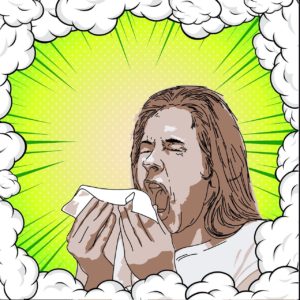BUNCOMBE COUNTY, NC – May 24, 2023 – The Asthma and Allergy Foundation of America said that about one out of four adults in America reported that they had seasonal allergies in 2021. This represents about 81 million people. Exposure to pollen from trees, grass and weeds can incite allergic symptoms. In North Carolina, tree pollen season can run from February through May with an April peak; grass pollen season is from April to June with a May peak; and weed pollen is from August to November with a September peak. Western North Carolina can lag behind the rest of the state by 1-2 weeks. The dates can vary depending on the weather. Warmer weather can start the pollen seasons earlier and cooler weather can slow it down.
Pollen is a powdery substance of microspores produced by the flowers of male seed-bearing plants that can be transported by wind, birds, insects or water to fertilize female seed-bearing plants. The pollen is so light that it can stay in the air for a long time until it rains and causes the pollen to fall to the ground. The proteinaceous part of the pollen grains can induce an allergic reaction in susceptible individuals. The symptoms include: nasal stuffiness, runny nose, watery eyes, itching of throat and eyes, sneezing, and wheezing. Pollen can also aggravate asthma with coughing and wheezing.
The warmer temperatures associated with climate change can aggravate seasonal allergies from longer spring and fall seasons. 2 researchers, from the Department of Climate and Space Sciences and Engineering at the University of Michigan, published an article in Nature Communications in March 2022, reporting that pollen season was about 20 days longer in North America in 2021 than in 1990 and that pollen concentrations were about 20% greater. Plants feed off of carbon dioxide and produce more pollen as atmospheric concentrations of carbon dioxide, a prominent greenhouse gas in the earth’s atmosphere that traps heat, increase from the burning of fossil fuels.
It is important for susceptible persons to know which type of pollen causes their allergic symptoms. They need to be aware of the daily pollen count for the offending agent. When the pollen count is high, consider wearing a face mask when going outdoors or avoid going outside. Natural treatment can consist of washing out the nose with saline solution after pollen exposure. Bathing will also remove surface pollen. Many people rely on allergy medicines like steroid nasal sprays and anti-histamines. It might be a good idea to contact your doctor and make a plan to relieve those nasty symptoms from seasonal allergies.
Listen to the full report below:
Contact: Dr. Dick Needleman, Health reporter, 103.3 AshevilleFM, [email protected]
More Posts for Show: Asheville FM News Hour
